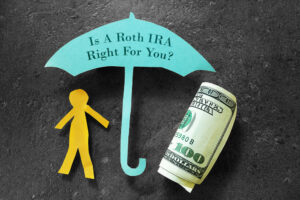Is a Roth IRA right for you?
 Consider investing in a Roth IRA if you’re searching for tax-free savings and greater freedom in retirement. While Roth IRA contributions are not sheltered from current taxes like contributions to traditional IRAs, they offer other tax benefits during retirement.
Consider investing in a Roth IRA if you’re searching for tax-free savings and greater freedom in retirement. While Roth IRA contributions are not sheltered from current taxes like contributions to traditional IRAs, they offer other tax benefits during retirement.
The Roth IRA advantage
- Retirement distributions are tax-free, including earnings. The whole balance of your Roth account is tax-free as long as you wait until you are 59.5 years old or older to take distributions!
- Save taxes on other earnings. Traditional IRA withdrawals throughout retirement raise your taxable income. This may raise the tax bracket on other income and may raise the taxability of your Social Security benefits. On the other hand, Roth withdrawals are not technically income, which helps keep tax rates as low as feasible.
- Greater adaptability in retirement. The IRS will start requiring required minimum distributions (RMDs) from regular IRAs in 2023 and thereafter once you turn 73. A 50% penalty will be a big conversation topic if you don’t! For Roth IRAs, there is no such requirement. You can let the money grow in the account for as long as you like (and you can even donate).
- At any age, contributions may be withdrawn tax-free. Only the earnings in a Roth are subject to an early withdrawal penalty of 10% if you must make one due to financial hardship. In other words, Roth contributions allow for tax and penalty-free withdrawals at any time. This is so because you made your initial Roth contributions with after-tax money. With regular IRAs, on the other hand, the full withdrawal is subject to a penalty if you make it before the age of 59.5.
Tax-free retirement savings
While there are many benefits to considering a Roth IRA contribution, not everyone is a good fit. These are some things to think about:
- Limitations on income. There are income restrictions for contributions to a Roth IRA, but there are no restrictions for rolling over money from other accounts into one. They will earn $144,000 as a single person in 2022 ($153,000 in 2023) and $214,000 as a couple in 2023 ($228,000).
- Limitations on contributions. You can contribute up to $6,000 ($7,000 if you’re 50 or older) in 2022. In 2023, this sum will grow by $500.
- Requirement of a 5-year active account. Before making withdrawals, you must keep your Roth account for five years in order to fully benefit from the tax-free treatment of investment earnings.
- Tax uncertainties in the future. Even though no one can predict the future, keeping up with tax trends is crucial to retirement planning. The optimal sort of retirement investment for you may ultimately depend on whether tax rates increase or decrease. The government also has the authority to alter your IRA’s tax status if they see fit.
You still have time to make IRA contributions through April 18, 2023, if you want to make the most of your savings for 2022. Please contact our RRBB accountants and advisors if you have any questions.
RRBB eNEWSLETTER
Get free tax planning and financial advice




